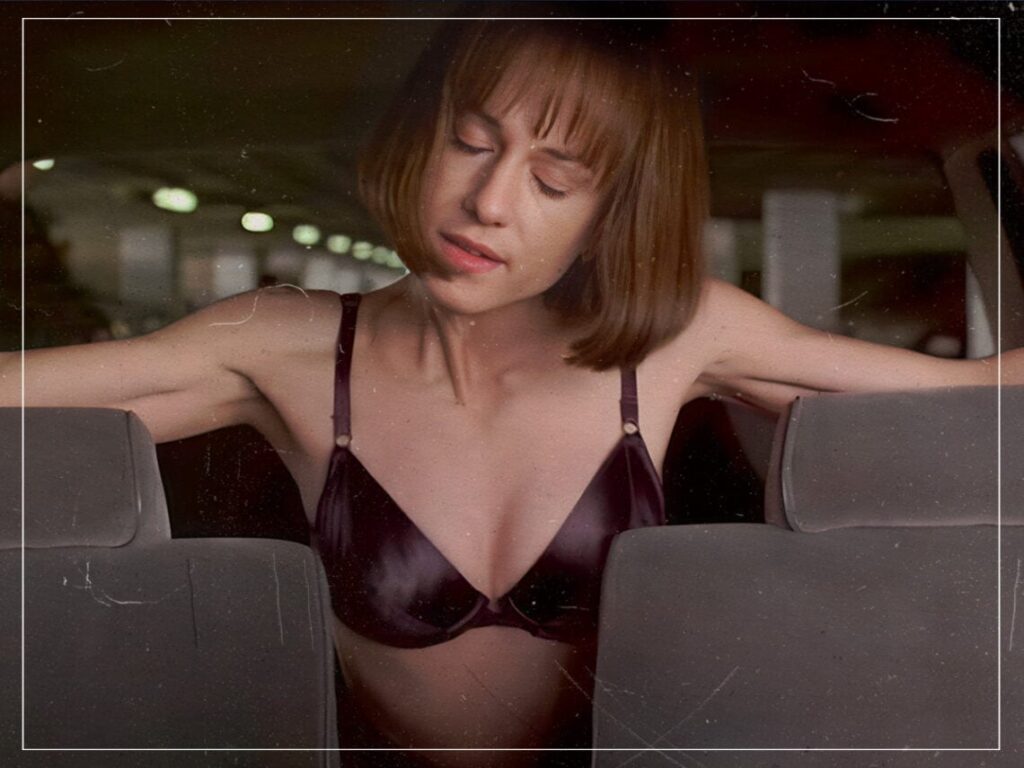David Cronenberg’s ‘Crash’ and the relentless quest for fulfilment
 Posted On
Posted On
(Credits: Far Out / Alliance Communications)
When David Cronenberg’s 1996 film Crash was released, controversy was rife, with many audiences shocked by the taboo and overtly erotic content within the narrative. While people shouldn’t have expected anything less from the filmmaker – a body horror pioneer who has previously explored the intersections between sexuality and the grotesque – there was still outrage among viewers. In many regions, the film was banned, and when it premiered at the Cannes Film Festival, it received its fair share of booing.
Yet, to dismiss Crash as nothing more than arthouse softcore porn entirely misses the mark. By using a transgressive theme – attraction and arousal from car crashes – the film opens up analysis from various perspectives, notably psychoanalytical and cultural dissections of the human experience in relation to sexuality, technology, capitalism, relationships, desire, and death.
The film occupies a space of its own and possesses a kind of twisted glamour. There’s something seductive about driving through a city at night, with the lights from skyscrapers and cars twinkling in the distance, but at the same time, there’s the lingering fear of a car accident, the darkness obscuring a clear path. It’s here, a dark, rainy highway, where James Spaders’ character, James, first comes across Holly Hunter’s Dr Helen Remington after crashing into her car and killing her husband.
At times, Crash feels clinical when the characters aren’t engaging in passionate autoerotic sex. Emotions seem to be processed differently here. Instead of grieving her dead husband in a normal way, Helen flashes her breast at James in the wreckage before meeting up with him and having sex in a car. They begin an affair, soon involving themselves in a group of car crash fanatics. Similarly, when James and his wife, Catherine, have sex, they lack passion for each other, only getting off on hearing about each other’s affairs.
Evidently, the relationships shown in Crash are atypical, but they serve as a vessel for Cronenberg to explore the weirder side of our human impulses and desires. These characters find normal sex and monogamous relationships unfulfilling. These kinds of exchanges are soulless and unthreatening, failing to truly excite them. When James comes close to death, he finds a strange sense of eroticism in the act of coming near the edge. As the French use the term ‘La petite mort’ (little death) to describe the feeling of weakness and the loss of control when orgasming, James finds this rush of adrenaline and the sensation of going as far as he can physically go purely sexual.
The characters in Crash all find the danger of car crashes and the innate lack of humanity present in the smell of oil, the shiny metal, and the cramped interiors alluring. They’re in constant search for something, a feeling that they haven’t yet achieved, but they know it is out there. Their extreme attempts to reach a greater sense of ecstasy – reenacting dangerous car crashes from history, chasing each other through busy highways – are never truly fulfilling because the only thing that will satisfy them is death.
As philosopher Slavoj Žižek puts it, “We don’t really want to get what we think we want.” We’re constantly striving for something more – the chase, the thrill, the journey, the clandestine nature of an activity, is often more enjoyable than actually having what we think we desire. Yet, we usually don’t realise this, continuing our search for fulfilment that will never truly be achieved.
Due to the choice-heavy and alienating nature of capitalism, where technology is rapidly evolving and pushing us further away from each other, we’re constantly striving for a sense of community. In Crash, the characters find this in a bizarre way, allowing themselves to merge with technology and become erotically entwined with artificiality and a distinct inhumanity.
It’s clear that what they really want is to break out of the moulds that capitalism sets out for us: they immerse themselves in taboos that challenge the status quo (everything from open relationships and homosexuality to car crash fetishes), but in the end, nothing is enough, only death can free them. When Catherine survives the accident at the end of the film, James tells her, “Maybe the next one.” Maybe the next crash will actually satisfy their urge, allowing them to die and experience one last truly euphoric moment.
[embedded content]
Related Topics


